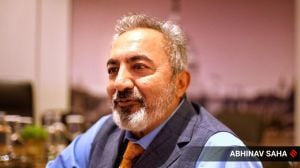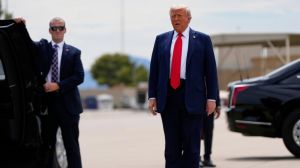Valley, here comes Sheikh Abdullah III
AS Kashmir prepares for another generational shift in its ruling party leadership, the optimism is unmistakable. Omar Abdullah’s entry ...

AS Kashmir prepares for another generational shift in its ruling party leadership, the optimism is unmistakable. Omar Abdullah’s entry into state politics generates that one emotion all too rare in the Valley these days: Hope.
At 32, the junior Abdullah is seen as a serious, clean politician with definite plans. Unlike his grandfather and even his father, the 21st century Abdullah has never doubted that Jammu and Kashmir is better off with a democratic and secular India. That itself does not suggest his entry into the rough and tumble of Kashmir politics will help bring about a lasting solution to the state’s problems. But, if he replaces his father as the CM, it could mean an end to the anarchic State administration which, in turn, could positively impact the day-to-day lives of the people.
The roots of the optimism lies in Omar’s serious nature, so unlike his flamboyant father’s. This makes him inaccessible to the corrupt elite within the political establishment and the bureaucracy. ‘‘If it was in my hands, I would love to drown corrupt bureaucrats in the Dal Lake. They are the the ones responsible for most of the ills Kashmir faces today,’’ he was quoted as saying in a recent interview. Even his worst critics admit he will probably be a far better chief minister than his father Farooq Abdullah ever was.
But will he be chief minister? The final ascension is still in doubt, following the spiking of Farooq’s vice-presidential plans. If father and son both continue to be in state politics, it can only spell chaos for the NC; Omar himself describes this as the ‘‘worst situation’’, pointing out that it would promote two power centres and a situation similar to the one in 1984, when the party and the family both split. ‘‘It does not mean I cannot work with my father. We have different approaches, but I cannot match his charisma and political skills,’’ he says.
| How long will we continue to ask for votes in the name of Sher-e-Kashmir Sheikh Mohammad Abdullah? We have to stop seeking support on the basis of history. Otherwise, we will pay heavily Omar Abdullah |
The self-confessed deficiencies will certainly be highlighted once Omar takes over as party chief. There’s no doubt that he will introduce innovative ideas and turn the orthodox peasant-centric party into a media-friendly urban organisation. But as the political boss, there are few who think he will measure up to his father or grandfather. In fact, because of his alienation from the Kashmiri language, culture and traditions — much of his adult life has been spent outside the state — he is already being dubbed the ‘Sonia Gandhi of Kashmir’. He is media-savvy and articulate in English (his mother tongue), but he has no idea about the pulse of his voters. Unlike his father, he can’t pull crowds and stir passions, simply because he doesn’t speak the language of the common Kashmiri.
Then, of course, Omar has to contend with the critics of the ‘‘undemocratic inheritance of power’’, which goes against the very grain of the National Conference’s ideology. But in real terms, the Abdullah family has always been the power centre of the NC. Though Sheikh Mohammad Abdullah would consult his colleagues on policy decisions, his personality and leadership ensured his was the last word.
Sheikh anointed his son Farooq Abdullah as party president on August 21, 1981, soon after he was elected to Parliament. Almost a year later, an ailing Sheikh inducted his son into the cabinet, but Farooq took over as CM only after his father’s death. This divided the family, and the fissures matured overnight into a coup by Sheikh’s son-in-law G M Shah, with the support of the Congress, split the NC and grabbed power in 1984. The coup has haunted Farooq ever since, dictating a non-confrontationist policy towards Delhi and culminating in the NC’s alliance with Congress in the 1987 polls.
For all the rough weather he faced, Farooq followed the same road map with his son. Omar was elected from the same Srinagar constituency that had been his own, but instead of his cabinet, Farooq found a place for him in the Centre after joining the BJP-led NDA.
Though it was clear from the outset that Omar would replace his father, lately, events have refused to follow the script. Hardpressed to find a substitute for Farooq in Kashmir, the Centre floated the idea of Omar’s return to coincide with his father’s move to Delhi. The plan failed to materialise, but by the time this became evident, Omar’s return had become a reality.
So long, Farooq’s temperament and iron fist — as also the absence of any major political activity in the state — ensured there was just one power centre in the party. Omar, unlike Farooq, is being inducted into state affairs while his father is still a potent, indeed, formidable force. There’s still chance that Omar will be party chief while his father continues to be CM. This will create the two power centres the party has avoided so long; the situation will be further compounded as father and son think, behave and work in complete contrast to each other.
|
‘We’ve been complacent, I want the party in my own image’ Story continues below this ad You are National Conference chief now, what are your plans? What changes do you wish to bring in National Confernece politics and policy? How will you prepare the party for the forthcoming elections? What will be your poll agenda? Is failure on the autonomy issue going to be an embarrassment? Or is autonomy also part of history now? Story continues below this ad What will be the NC’s policy on any initiative launched by the Centre to hold talks with the separatists here? — Muzamil Jaleel |
Photos





- 01
- 02
- 03
- 04
- 05


























